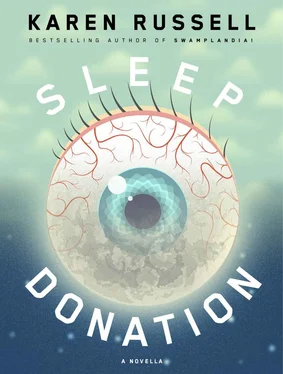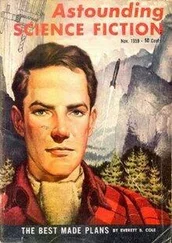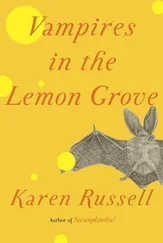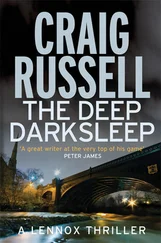The official cause of death was organ failure.
I know it doesn’t sound like much, on paper.
The same month Dori died, the CDC released the first case definition of the new terminal insomnia. Early estimates suggested that several hundred people in the United States were suffering from a total sleep loss; one year after my sister’s funeral, this number had swelled to twenty thousand. “Orexins,” the media taught us to call them. So that, almost immediately, the disorder became a metonym for its chosen victims. George Washington University Hospital opened the first dedicated critical-care insomnia ward —it was full within days. Congress allocated two billion for research.
It was not long thereafter that the mechanics of sleep donation were refined by Gould’s team at the D.C. sleep clinic, and the Slumber Corps began its good work.
In the months following the CDC release, many people dismissed the disorder as an exaggeration of a universal American condition. Who was sleeping enough? Nobody! The “crisis” seemed like more TV hyperbole designed to keep us glued to our screens, watching mattress commercials. America, in the childhood of our understanding of the insomnia crisis, called the first victims liars, hypochondriacs, wackos, crank-addicts, insurance defrauders, anxious plagiarists of “real,” biological disorders.
Now, of course, we know all too well that the insomnia epidemic is real. You need only consult its victims’ pink-spoked eyeballs, their gaunt faces engraved behind moonlit windows. Neuroscientists have since concluded that for a significant portion of the country’s population, the signalling function of the neuropeptide orexin has become impaired. Orexin deficiency has been linked to human narcolepsy, but this dysfunction causes the opposite effect: an untenable hyperarousal. Sleep becomes impossible. People like Dori remain conscious for months and even years, hostages of their brain’s chemicals, trapped in the vigilance state that eventually kills them.
What triggers the dysfunction in some brains as opposed to others? Do these people have some inherited anomaly —an underlying genetic predisposition to wakefulness? A higher-wattage consciousness? Or is the trigger environmental? Nobody knows. It’s the two-billion-dollar question. To date, every known case of the orexin-disruption has occurred in the Americas; nobody knows why this should be so, either. Some speculate that the sickness is connected to the oceans’ tides, magnetism, the poles, the hemispheres, the net of light and shadow on the globe.
Other pundits promise, with weird relish, that we are seeing “the end of sleep as we know it.” TV has become a glum Hall of Prophets: Dr. Daveesha Frank from the Boston Sleep Tank, who speaks like a robot programmed to self-destruct; dour professors wearing sunflower-yellow ties that film well. According to these professional Cassandras, sleep has been chased off the globe by our twenty-four-hour news cycle, our polluted skies and crops and waterways, the bald eyeballs of our glowing devices. We Americans are sitting in an electric chair that we engineered. What becomes of our circadian rhythms, the “old, glad harmonies” that leapt through us like the vascular thrust of water through leaves of grass? Bummer news, Walt: that song’s done. And the endogenous clock, the suprachiasmatic nucleus, hereditary prize of every human, that tiny star cluster of neurons in the hypothalamus which regulates our yawning appetites for hard winter light and spacey blackness, the master clock that syncs us to one another, and to the Earth’s rotation, the sun and the moon? To all the sister kingdoms on the twenty-four-hour circuit? Bacteria, Gila monsters, great sequoias, blue whales, orange groves, bear cubs, mustangs, toadstools, leopards, golden eagles, hyacinths, hippopotami, those tiny wizards, the butterflies, those glue-artists, the arachnids, and all the sequined life on the seafloor, the black urchins that improbably still clock time with us? Bummer news, everyone: the clock stops for humanity. Time itself will soon become an anachronism. Time, as our species has lived it on this planet, will cease to exist. No more dark/light binary. No more active red daytime, blue evening dissolving. No longer is sunshine the coagulant of consciousness, causing us to clot into personalities, to cohere once more on our pillows each morning. These TV scientists predict “a global desertification of dreams.” Soon, they promise, the disruption will afflict all of us. Sleep will go extinct. And eventually, unless we can find some way to synthesize it, so will we.
Generally, I’m mistrustful of these warblers, who do the dread-crescendo. But I’m embarrassed to report that the Slumber Corps has borrowed a page from their playbook, “eschatalogical manipulation.” At Sleep Drives in Alabama, Georgia, and Florida, we are test-screening a documentary created by those ratings whores, the worst of the cable news fear lords, “Is Sleep Going Extinct?” I’m afraid to say it’s been very effective. We show it at night, like a popcorn horror flick. Terror, we’ve discovered, is a powerful donation-stimulant.
Meanwhile, sleep clinics in this country are operating at two hundred percent capacity; “Night Worlds” have sprouted all over America. “Night Worlds” have some kinship with the circled wagon trains of the West: the sleepless closing ranks against the night. They form spontaneously, on the margins of cities, but have developed an oddly standard layout: mazes of tents, nocturnally blooming speakeasies. Night World merchants cater to the sleepless ones with black market remedies: “moonlamps” to ease the dreariness of unremitting wakefulness, “cave medicines” derived from ancient myrtles and lichens. Songbirds from Germany and Thailand are sold as “bio-cures” —their binary chirping is said to reprogram dreams into the mind. Some Night Worlds function as quasi-legal campgrounds for homeless and unemployable insomniacs. These places are tolerated by the local authorities because they help the hospitals with overflow. At the ERs, many new insomniacs are being turned away nightly. Sent back to twist in exile on their mattresses, cutting their eyes on the moon’s blade until a donor can be found for them. They await our call. Until they are eligible for a sleep donation, there is nothing to be done for the majority of these people.
At Sleep Drives, we also screen the now-infamous footage of one of the first cases of the terminal insomnia: a young Guyanese woman from a suburb of Houston. After five weeks of near-total sleep loss, her braids have turned totally white. Her frosty hair looks almost comic, like a fright wig; her face is child-smooth. She presented at the Gould clinic in D.C. after fourteen complete days and nights without cycling into sleep. She is wearing a fluffy pink sweater, lilting gibberish. Her eyes bulge so that you cannot see the lids.
Nothing newsworthy, you might correctly assert, about the public performance of illness. Death’s dress rehearsal is ongoing at any bus stop in America, where sick people beg us not for minutes of sleep but for metallic dollar-flakes, wealth dandruff. Long before the sleep crisis, our downtown was a maze of sidewalk asylums. Immobilized people form a human shrubbery behind the courthouse, their lips whispering, their pink and brown palms extended, flat fronds shivering with need. Which is all to say: nothing the least bit strange to us, about public psychosis.
What makes this footage harrowing is its juxtaposition with a photograph of this Guyanese woman taken just five months earlier, before the onset of her orexin-disruption: her hazel eyes were shining and calm, tenanted by a sane woman, tethered to her memories; the eyes were seeing, presumably, only what was visible to everyone else in a room; her face was happy and plump, irrigated by sleep.
Читать дальше












